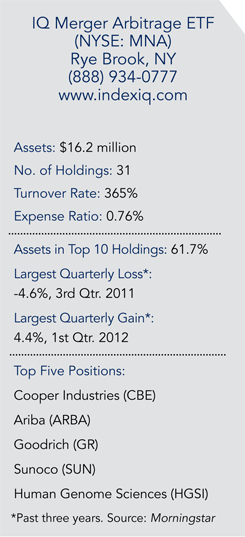Mergerarbitrage ETF banks on M A pickup
Post on: 28 Май, 2015 No Comment

JohnSpence
BOSTON (MarketWatch) — An exchange-traded fund that specializes in merger-arbitrage has received a lukewarm reception in the market, but a burst of deal activity may invite some investors to take a closer look.
The IQ Merger Arbitrage ETF MNA, +0.31% tracks an index designed to profit from the spread between an acquisition target’s current stock value and the higher takeover price. Risks include the price being lowered in negotiations or the deal falling apart.
Investors hear it’s a hedge-fund-like strategy and think the ETF is designed to shoot the lights out, but it’s not, said Adam Patti, chief executive at IndexIQ, the fund’s manager, in an interview.
Instead, it’s designed to diversify portfolios and dampen overall volatility because the strategy tends to not move in lockstep with major stock indexes, he said.
The ETF was introduced in November 2009 and its assets are below $30 million. See archived column on the launch.
In some ways, the ETF is a watered-down version of the merger-arbitrage strategies employed by mutual funds including Merger Fund MERFX, +0.13% and Arbitrage Fund ARBFX, +0.00% which are often categorized as long-short funds. These funds’ annual returns over the past decade have been steady, which makes them attractive to more conservative investors. For example, the two funds were down only slightly in 2008, a year when the S&P 500 Index lost more than 35% in the credit storm.
Merger-arbitrage funds have seen more quarry recently in the wake of greater M&A activity, notably BHP Billiton Ltd.’s BHP, +0.81% bid for Potash Corp. POT, +0.64% and the bidding war for data-management provider 3Par Inc. PAR, +0.85% between computer titans Hewlett-Packard Co. HPQ, +0.34% and Dell Inc. DELL See related story on attractive technology sector M&A targets.
Some companies with high levels of cash on their balance sheets are on the prowl, and even the IPO market is showing signs of renewed life. See related story on the M&A boom in August.
Profits and margins
IQ Merger Arbitrage ETF doesn’t speculate on deals — it only buys the target’s shares after a transaction has been publicly announced. Therefore, it won’t capture the big rallies that typically occur in the target’s stock after a potential transaction is unveiled.
Rather, it tries to lock in the subsequent, thinner spread if the deal is eventually consummated.
Rather than shorting the acquirer’s stock, which many merger-arb funds do when the acquirer is using its own stock for currency, the ETF uses futures contracts on the S&P 500 and MSCI EAFE Index to short entire markets. The ETF hunts for deals around the globe.
Patti said the fund, which has an expense ratio of 0.75%, typically is exposed to between 25 and 45 deals. The two largest stock holdings are Qwest Communications International Inc. Q, +0.55% and Hewitt Associates Inc. HEW, +0.49%
The ETF’s cash levels can vary and typically rise when M&A activity slows, Patti explained, although he added there are always some deals out there.
The CEO said the tracking index was designed to target the types of deals that have been successful in the past. For example, lowball offers are excluded because they tend not to close or create value for investors, he said.
IQ Merger Arbitrage ETF was essentially flat this year through Aug. 26 with a gain of 0.5%, while the SPDR S&P 500 ETF SPY, +1.27% was down 4.7%, according to investment researcher Morningstar Inc.
The index is rebalanced on a monthly basis, so stocks aren’t added to the portfolio immediately after a potential deal is announced. The tax efficiency of the ETF structure is helpful in a high-turnover strategy like merger arb, Patti said.














